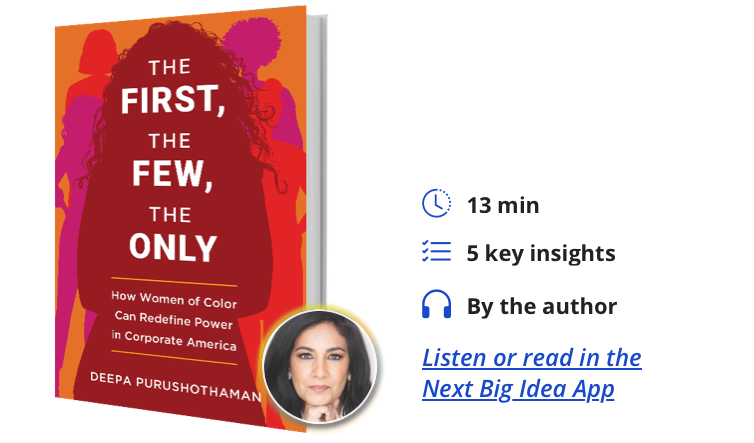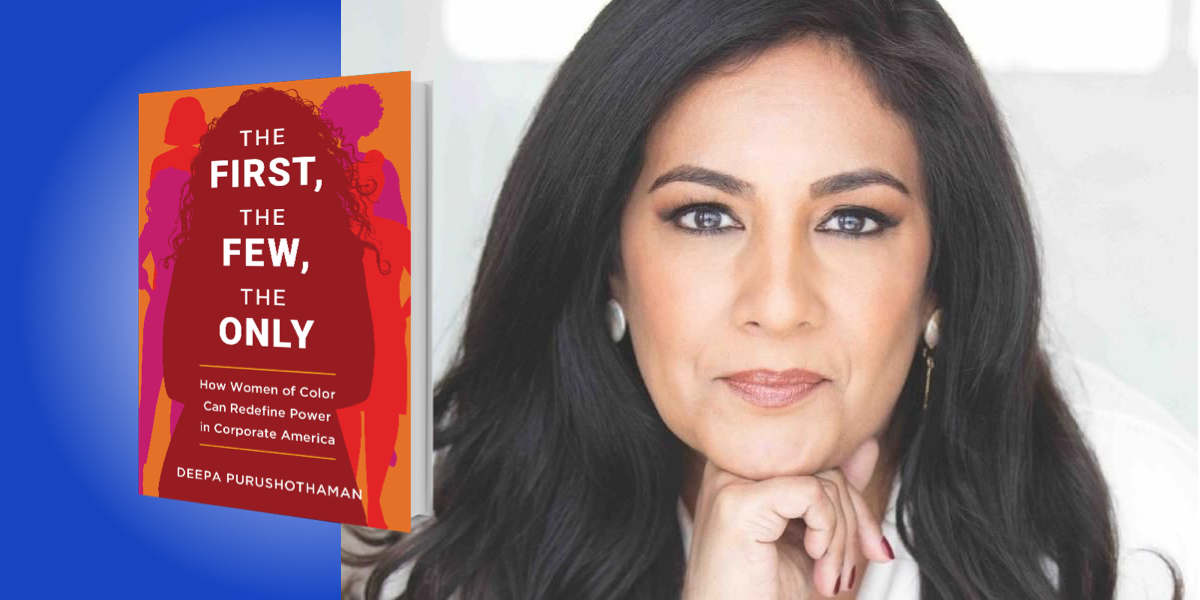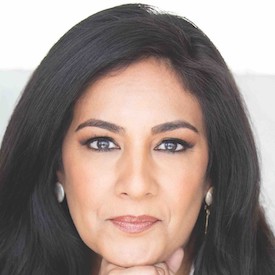Deepa Purushothaman is the co-founder of nFormation, a membership-based technology platform created by women of color, for women of color, to build a community that provides a safe, brave space for WOC. She is also a Women and Public Policy Program Leader in Practice at the Harvard Kennedy School, where she researches systemic racism in corporate structures.
Below, Deepa shares 5 key insights from her new book, The First, the Few, the Only: How Women of Color Can Redefine Power in Corporate America. Listen to the audio version—read by Deepa herself—in the Next Big Idea App.

1. Corporate America is facing a crisis, and WOC are the new power brokers.
In March 2021, nFormation conducted a study with Fairygodboss which suggested that two-thirds of the WOC interviewed were contemplating leaving their roles within the next twelve months. COVID-19 has renewed tension in the conversations of health versus wealth, and of purpose versus paycheck. More people are questioning what their work is in the world, and WOC are asking these questions with even more urgency and frequency.
Data shows that the impacts of COVID-19 and the “shecession” were highest among groups of WOC, especially Latina and Black women. More WOC are starting businesses than ever before, and are doing it specifically to create cultures that work for us.
There have always been discussions about WOC leaving corporate spaces, and we are on the precipice of a great reckoning. Women of color are tired, feel undervalued and unseen, and are ready to demand more; at the same time, we are more sought after than ever before. This is our moment to ask new questions about what we want, where we want to spend our time, and how much we are willing to conform, perform, and produce to get ahead.
For companies and leaders, it is time to understand the experience of WOC by listening and helping to make change. If you don’t, you will keep losing us. Not only will this hurt us—it will hurt you. We bring unique experiences to the workplace from our lived experience of forging new paths in environments where we are firsts, few, or only. WOC can be the workplace innovators, bridge builders, leaders, and designers of what comes next.
2. Corporate America is not a meritocracy.
We are taught by school, the media, and even by our families that there are written and unwritten rules that underpin many societal systems. But have you ever stopped to question where those beliefs come from, and whether they need an update?
“We are always code switching or editing ourselves to fit into spaces. We are often asked to do more culture building and unpaid work than other groups, and we deal with high rates of microaggressions and racism daily.”
Many of these “beliefs” are delusions—they exist to maintain the status quo. One of these is the idea that corporate America is a meritocracy that shows up the same for all people. Believing this harms WOC. Meritocracy suggests only the best rise, so if we don’t rise, there is something wrong with us. WOC end up overworking ourselves to fit into a system that doesn’t always see or hear us.
Systems show up differently for different people. These differences are evident in how WOC are hired, advanced, and treated in their day-to-day lives. Data supports this—we tend to hire and advance people that look like us. We can’t possibly fix those challenges if we deny their existence.
My own research shows the workplace is harder to navigate as a woman of color. We are always code switching or editing ourselves to fit into spaces. We are often asked to do more culture building and unpaid work than other groups, and we deal with high rates of microaggressions and racism daily. It’s time to take apart key myths about our corporate structures, including meritocracy, scarcity, and competition.
3. Workplaces are making people sick.
The biggest surprise in my research is a trend among the most accomplished women of color: all are exhausted, suffering, and yearning to find a way to keep their plates spinning. Many women of color were taught from a young age that they must work harder and do more to be treated fairly, or even be in the running.
Women of color aren’t just burnt out—they are traumatized. The effects of microaggressions and racism build up over time. The World Health Organization says that discrimination is a health risk and, in some cases, more impactful than lifestyle and health-care choices. Scholars found that perceived racism and discrimination are linked to increased risk for hypertension, infectious illnesses, and a lifetime of physical diseases.
“Part of finding power is doing the inner work to get healthy, but part of forging power is finding others to heal with.”
When women of color stuff down the pain and frustration that come from unfair work practices, it pushes them to work too hard to live up to expectations. There is a growing opinion that beyond high levels of stress, WOC are masking trauma at work. This trauma comes from feeling on guard because of racism, never believing we fully belong anywhere, and lacking a sense of “psychological safety.”
Two out of three women I interviewed had some type of chronic condition. For some, the issue manifested as skin rashes, adrenal fatigue, or fertility issues. For others, it showed up as a mysterious stomach disorder—perhaps the result of what some women call “ingesting ideologies.” Almost all the women who were ill or stressed had one of these four complaints, and medical studies support these findings. But it can show up in myriad ways, including chronic fatigue, insomnia, depression, anxiety, and more.
If WOC are going to find their power, we need to reclaim our health. In order to process work trauma, we need to talk about it. Part of finding power is doing the inner work to get healthy, but part of forging power is finding others to heal with.
4. The pie doesn’t have to be redistributed—it can grow.
We have all been indoctrinated with the concept of scarcity—that there are limited resources for which we have to compete. We live with a myth that if we don’t outshine, outwork, and outdo the next person, they will get the opportunity. The “table” is a metaphor in corporate America, at which there are a set number of seats. In order to get a seat, someone needs to get up from a seat. This mindset is making many of us unwell, and it is making our workplaces less inclusive.
In 2017, Ernst & Young surveyed 1,000 workers and found that more than one-third of respondents felt their company’s focus on diversity lessened the focus on white men. When you are accustomed to privilege, equality can feel like oppression, but it doesn’t have to be this way.
“Many WOC feel that white women had been the most vicious in blocking their advancement. Scarcity even makes women of color compete against each other.”
The belief of the limited pie makes women compete against women. Scarcity makes us believe there are limited seats for women, and even fewer seats for women of color. Many WOC feel that white women had been the most vicious in blocking their advancement. Scarcity even makes women of color compete against each other.
The idea that there are winners and losers must be eradicated. We need to erase the idea that corporate America is a glorified game of Musical Chairs, in which one must run as fast as they can, and push the next person to the floor to get a seat. The pie doesn’t have to be redistributed—it can grow. We need to grow the overall set of opportunities if we want inclusion to take root.
5. We have the power and permission to undo anything that came before.
Structures are falling around us. Everyday norms—including our vocabulary, ways of doing business, and outdated societal constructs—are changing fast. Our meetings have already transformed from conference rooms to Zoom squares. The conversations we are allowing in the workplace are also moving quickly.
We have power and permission to undo anything that came before us. An interview with a Black lawyer and lobbyist reminded me of the ancient saying, “The king has died, long live the king.” We give power and respect to the new king. We legitimize them. We are all kingmakers.
The events of 2020 and 2021 created new ways of thinking, especially around the fragility of our world. The last few years have given us space to figure out what’s important. We can remake power so that it is collaborative and energizing. We can take power from our old gods and kings, like scarcity and competition, and give it to new queens, like collaboration, health, and power for good.
We need to move from bystanding to asking ourselves hard questions about what comes next. If we’re going to solve the most entrenched issues facing our planet today, we must move from exclusion to inclusion; from privilege to generosity; from scarcity to abundance; from the first, few, and only, to the many. Together we can remake power, success, and leadership.
To listen to the audio version read by author Deepa Purushothaman, download the Next Big Idea App today:































